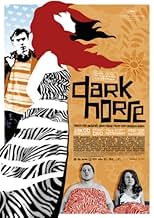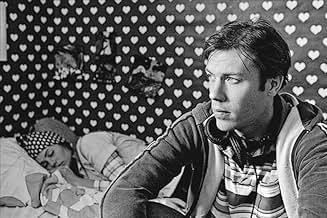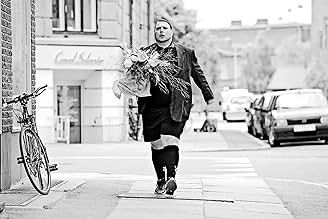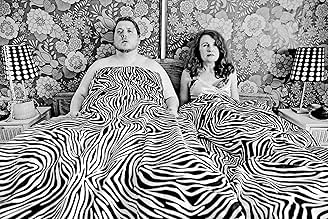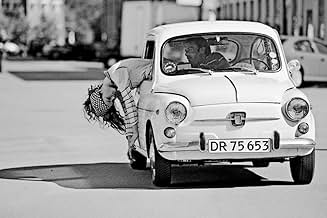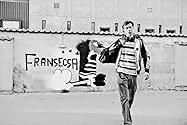AVALIAÇÃO DA IMDb
7,1/10
3,5 mil
SUA AVALIAÇÃO
Adicionar um enredo no seu idiomaA young man spurs romance and helps his friend and himself go through times and struggles of their ordinary life in Denmark.A young man spurs romance and helps his friend and himself go through times and struggles of their ordinary life in Denmark.A young man spurs romance and helps his friend and himself go through times and struggles of their ordinary life in Denmark.
- Direção
- Roteiristas
- Artistas
- Prêmios
- 9 vitórias e 9 indicações no total
Asta Esper Hagen Andersen
- Mormor Lovisa
- (as Asta Esper Andersen)
Peder Thomas Pedersen
- Graffitikunde
- (as Peder Pedersen)
- Direção
- Roteiristas
- Elenco e equipe completos
- Produção, bilheteria e muito mais no IMDbPro
Avaliações em destaque
DARK HORSE (Dagur Kári - Denmark/Iceland 2005).
"Volksne mennesker" is the second feature from Icelandic director Dagur Kári, after his much praised debut "Nói Albinói" (2003), which I haven't seen yet, but I can't wait after catching this little gem. For this film, he relocated the story from the icy coasts of Iceland to the Danish capital of Copenhagen, where we meet Daniel (Jacob Cedergren), a graffiti artist who sprays some stylish love declarations on the wall. Not his own love interests, but from others who want to surprise their girlfriends and pay him some under the counter money for it. In many ways Daniel is the working definition of the term loser. He has no money, no work, he's lazy and hasn't got a clue what going on around him ('How am I gonna be a father? I don't even know the name of the prime minister?'). He doesn't really care about anything and doesn't bother to pay the rent until he's kicked out. Above all, his social skills (more clumsy than impolite) leave a lot to be desired, but by sheer luck, charm and good looks he seems to be passing by just well.
The film is filled with many absurd but very funny conversations, that are sometimes explained through Daniel's supposed dyslexia. When Daniel drives around the city and ignores a 'no turn left' sign, he excuse to the police is: 'I didn't understand, I thought I was obliged to turn left, I'm dyslexic.'
Almost every character in the film seems to have lost it, and can be categorized from a little quirky to completely off the wall. His obese friend Roger (Nicolas Bro), nicknamed "Grandpa", works at some kind of sleep research clinic, and dreams of becoming a professional football referee. He is just as crooked as him, but in a slightly different way with a rather misplaced sense of self-righteousness and self-confidence. But one day Daniel meets the mysterious girl Franc (a wonderful performance by Tilly Scott Pedersen, I'm absolutely smitten about her), who works at a local bakery. When the two meet, she is under the influence of psychedelic mushrooms and vomits all over the floor of the bakery and gives her a ride home in his little Fiat. But he falls in love with this girl, who still lives with her twisted sex-starved mother and is practically the female version of him, going through life just as careless as he does.
Near the end the initial comedic element makes way for a more dramatic turn, when the characters have to face some real choices. In the first hour, they're all so sketchily introduced, it hard to see them as real characters. And I wasn't very impressed by the much praised 16mm black-and-white cinematography by Manuel Alberto Claro, which was kind of sloppy and inconsistent, with many scenes inexplicably down lit. But these flaws are easily forgiven, with this kind of fresh and observative writing and all these wonderful performances. Tilly Scott Pedersen's smile and her infatuating on-screen presence alone had me going till the end.
This is not just some desperately quirky indie, it's filled with wonderful characters, very funny and with a beautiful music score as well. In some scenes, the score seemed exactly the same as in the German MUXMAÜSCHENSTILL (2004). Not a perfect film, but very enjoyable. I'm looking forward to any of Dagur Kári's future work.
Camera Obscura --- 8/10
"Volksne mennesker" is the second feature from Icelandic director Dagur Kári, after his much praised debut "Nói Albinói" (2003), which I haven't seen yet, but I can't wait after catching this little gem. For this film, he relocated the story from the icy coasts of Iceland to the Danish capital of Copenhagen, where we meet Daniel (Jacob Cedergren), a graffiti artist who sprays some stylish love declarations on the wall. Not his own love interests, but from others who want to surprise their girlfriends and pay him some under the counter money for it. In many ways Daniel is the working definition of the term loser. He has no money, no work, he's lazy and hasn't got a clue what going on around him ('How am I gonna be a father? I don't even know the name of the prime minister?'). He doesn't really care about anything and doesn't bother to pay the rent until he's kicked out. Above all, his social skills (more clumsy than impolite) leave a lot to be desired, but by sheer luck, charm and good looks he seems to be passing by just well.
The film is filled with many absurd but very funny conversations, that are sometimes explained through Daniel's supposed dyslexia. When Daniel drives around the city and ignores a 'no turn left' sign, he excuse to the police is: 'I didn't understand, I thought I was obliged to turn left, I'm dyslexic.'
Almost every character in the film seems to have lost it, and can be categorized from a little quirky to completely off the wall. His obese friend Roger (Nicolas Bro), nicknamed "Grandpa", works at some kind of sleep research clinic, and dreams of becoming a professional football referee. He is just as crooked as him, but in a slightly different way with a rather misplaced sense of self-righteousness and self-confidence. But one day Daniel meets the mysterious girl Franc (a wonderful performance by Tilly Scott Pedersen, I'm absolutely smitten about her), who works at a local bakery. When the two meet, she is under the influence of psychedelic mushrooms and vomits all over the floor of the bakery and gives her a ride home in his little Fiat. But he falls in love with this girl, who still lives with her twisted sex-starved mother and is practically the female version of him, going through life just as careless as he does.
Near the end the initial comedic element makes way for a more dramatic turn, when the characters have to face some real choices. In the first hour, they're all so sketchily introduced, it hard to see them as real characters. And I wasn't very impressed by the much praised 16mm black-and-white cinematography by Manuel Alberto Claro, which was kind of sloppy and inconsistent, with many scenes inexplicably down lit. But these flaws are easily forgiven, with this kind of fresh and observative writing and all these wonderful performances. Tilly Scott Pedersen's smile and her infatuating on-screen presence alone had me going till the end.
This is not just some desperately quirky indie, it's filled with wonderful characters, very funny and with a beautiful music score as well. In some scenes, the score seemed exactly the same as in the German MUXMAÜSCHENSTILL (2004). Not a perfect film, but very enjoyable. I'm looking forward to any of Dagur Kári's future work.
Camera Obscura --- 8/10
I never did get around to seeing Dagur Kári's first film, Nói albínói, but now that I've seen his second, I'll make it a priority. Dark Horse (as it was called at AFI Fest in Los Angeles) is a very funny, stylish, and genuinely touching comedy in the vein of Jim Jarmusch's early films, albeit livelier and less adamantly cerebral.
Daniel (Jakob Cedergren) is a graffiti artist who probably embodies the term loser more fully than anyone you have ever met. He's broke, lazy, irresponsible and dorky. This is a comedy, though, and appropriately, Daniel is a lovable loser. Morfar (Nicolas Bro) is Daniel's only apparent friend, an overweight dude who works in a sleep clinic and maintains aspirations of becoming a soccer referee.
The story gets underway when these two guys visit a bakery and the beautiful woman behind the counter (Tilly Scott Pederson) spontaneously declares her love for Morfar, who is so taken aback by her expression that he runs away. Immediately after, Daniel discovers that this chick is tripping on psychedelic mushrooms, casting some doubt on her romantic declaration, and he aids her in getting home. So begins a loser's love triangle which by the end of the film has very gracefully become about something else: the possibility of elusive, fundamental personal change, both for the better and for the worse.
Every member of this cast, down to the most peripheral supporting role, is terrific. The two leading men, in particular, are understated and yet deeply human. Kári's sense of the visual and the aural (he clearly cares a lot about sound) is very hip but always elegant. He shoots quirky angles in high contrast back-and-white, but every shot is about something; even his flourishes have purpose.
Most importantly, the script by Kári and his co-writer, Rune Schjøtt, gracefully treads that very risky territory between the offbeat and the naturalistic. His characters move through their lives whimsically and even the narrative structure seems vaguely improvised, yet there is a graceful evolution to the unfolding of events that, by the end, gives the classic sense of inevitability that we associate with the best film writing.
(It speaks volumes, I think, that the English subtitles were sometimes impossible to read because of the stark white areas in the frame, and yet I never felt that I missed a beat).
I don't see a U.S. release date indicated on the IMDb, but I can't imagine that Dark Horse (or whatever they're going to call it) won't ultimately find a distributor. This is that rare breed of crowd-pleasing art flick that any half-astute specialty studio should be fighting over.
Daniel (Jakob Cedergren) is a graffiti artist who probably embodies the term loser more fully than anyone you have ever met. He's broke, lazy, irresponsible and dorky. This is a comedy, though, and appropriately, Daniel is a lovable loser. Morfar (Nicolas Bro) is Daniel's only apparent friend, an overweight dude who works in a sleep clinic and maintains aspirations of becoming a soccer referee.
The story gets underway when these two guys visit a bakery and the beautiful woman behind the counter (Tilly Scott Pederson) spontaneously declares her love for Morfar, who is so taken aback by her expression that he runs away. Immediately after, Daniel discovers that this chick is tripping on psychedelic mushrooms, casting some doubt on her romantic declaration, and he aids her in getting home. So begins a loser's love triangle which by the end of the film has very gracefully become about something else: the possibility of elusive, fundamental personal change, both for the better and for the worse.
Every member of this cast, down to the most peripheral supporting role, is terrific. The two leading men, in particular, are understated and yet deeply human. Kári's sense of the visual and the aural (he clearly cares a lot about sound) is very hip but always elegant. He shoots quirky angles in high contrast back-and-white, but every shot is about something; even his flourishes have purpose.
Most importantly, the script by Kári and his co-writer, Rune Schjøtt, gracefully treads that very risky territory between the offbeat and the naturalistic. His characters move through their lives whimsically and even the narrative structure seems vaguely improvised, yet there is a graceful evolution to the unfolding of events that, by the end, gives the classic sense of inevitability that we associate with the best film writing.
(It speaks volumes, I think, that the English subtitles were sometimes impossible to read because of the stark white areas in the frame, and yet I never felt that I missed a beat).
I don't see a U.S. release date indicated on the IMDb, but I can't imagine that Dark Horse (or whatever they're going to call it) won't ultimately find a distributor. This is that rare breed of crowd-pleasing art flick that any half-astute specialty studio should be fighting over.
Although I appreciated the other comments submitted to this point, I saw this movie at the Cleveland International Film Festival and was terribly perplexed by what it meant to convey.
Initially it's a comedy, and a wonderful one at that. Then the characters get hit hard by life's events. Then they change. Unusual events occur, but we don't know why.
It's not until the end that we're left with the magical part of the story the movie is telling. As the main character, Daniel undergoes a slow but significant metamorphosis from a bum (but a lucky one) to a character who cares about others and has become responsible.
Although at first a minor character, the judge is a sort of doppelganger for Daniel. We first see him in the sleep clinic, then in the court where he pronounces Daniel's sentence. The near-collision with Daniel seems to trigger "the switch", where the judge then steals a gift for his child. By the time we see him staying at the airport instead of going to a meeting we're not even remotely surprised that he runs into Daniel. By the time his wife is confronted with the evidence of his theft the translation to bum is complete.
Now to see the movie paying attention to how and when the magic takes effect: is it the near-accident or when the elephants parade by? What about the flash of color? Is there something else?
A good watch to begin with and a better watch the second time around!
Initially it's a comedy, and a wonderful one at that. Then the characters get hit hard by life's events. Then they change. Unusual events occur, but we don't know why.
It's not until the end that we're left with the magical part of the story the movie is telling. As the main character, Daniel undergoes a slow but significant metamorphosis from a bum (but a lucky one) to a character who cares about others and has become responsible.
Although at first a minor character, the judge is a sort of doppelganger for Daniel. We first see him in the sleep clinic, then in the court where he pronounces Daniel's sentence. The near-collision with Daniel seems to trigger "the switch", where the judge then steals a gift for his child. By the time we see him staying at the airport instead of going to a meeting we're not even remotely surprised that he runs into Daniel. By the time his wife is confronted with the evidence of his theft the translation to bum is complete.
Now to see the movie paying attention to how and when the magic takes effect: is it the near-accident or when the elephants parade by? What about the flash of color? Is there something else?
A good watch to begin with and a better watch the second time around!
10kdimov76
I already saw this movie two times in the last two years - and I can say that all these great comments about it are more than justified. This movie is much more than just a comedy or a sentimental story - it has something almost supernatural in it - of course because it makes you think about life but also because it makes you 'feel' the story. The color moment was impressive, everything else was in the right pace and time. Movies like this are very rare in this century - for me this is not a movie but a masterpiece of art.
Of course masterpieces are not always understandable to simple people...
Of course masterpieces are not always understandable to simple people...
A lot of art movies are beautiful but ain't fun. Dark horse on the other hand is different. The movie is cinematographic really beautiful (a lot of the shot's could be art photo's) but besides that is a nice story mixed with some dark humor. I have a spot for movies that start out strong, and this one really had a nice opening!
The scenery reminds me of French movies from the sixties, maybe that's because the movie is not in color (though it was filmed in color), the looks of the girl, the fiat 500 he drives, the interiors they used or just because of the title poster (they lay in front of the fiat on a field). But it gives the Dark Horse something nice, all together the best movie a saw in months.
It's a shame that so few have seen this movie, it was just me and my girlfriend at the cinema and given the number of votes here on IMDb or rottentomatoes it is not very popular.
The scenery reminds me of French movies from the sixties, maybe that's because the movie is not in color (though it was filmed in color), the looks of the girl, the fiat 500 he drives, the interiors they used or just because of the title poster (they lay in front of the fiat on a field). But it gives the Dark Horse something nice, all together the best movie a saw in months.
It's a shame that so few have seen this movie, it was just me and my girlfriend at the cinema and given the number of votes here on IMDb or rottentomatoes it is not very popular.
Você sabia?
- CuriosidadesThe scene where "Morfar" goes to his referee exam was entirely improvised. The script just said "Morfar goes to his exam".
Principais escolhas
Faça login para avaliar e ver a lista de recomendações personalizadas
- How long is Dark Horse?Fornecido pela Alexa
Detalhes
Bilheteria
- Orçamento
- € 1.850.000 (estimativa)
- Faturamento bruto mundial
- US$ 10.626
- Tempo de duração1 hora 49 minutos
- Cor
- Mixagem de som
- Proporção
- 1.85 : 1
Contribua para esta página
Sugerir uma alteração ou adicionar conteúdo ausente

Principal brecha
By what name was Voksne mennesker (2005) officially released in India in English?
Responda
